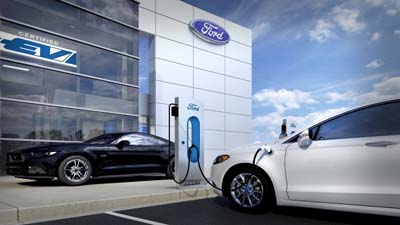The nearly 17,000 franchise dealerships in the U.S. will invest an estimated $5.5 billion in new infrastructure to sell electric vehicles, according to the National Automobile Dealers Association (NADA), a car dealer trade group.
NADA didn’t elaborate on this estimate, leaving out details such as a timeline for the spend, according to Green Car Reports, but it did mention some automakers have asked dealerships to invest anywhere between $100,000 and $1 million for chargers and other upgrades to sell EVs.
NADA said these costs “do not necessarily include the specialized equipment purchases needed to service EVs or the additional costs from local utilities for extending new power lines or adding transformers" to support EV charging.
According to NADA, there are 16,733 franchise dealerships across the country today, employing nearly 2.3 million people and paying an average yearly wage of almost $89,000.
With increasing competition from automakers that rely on direct sales, like Tesla, Rivian and Lucid, traditional franchise dealers are under pressure from legacy automakers to step up their EV game. However, a recent report from Sierra Club showed 65% of car dealers don’t have any EVs on sale and 45% of dealers say they’re unwilling to sell them.
That’s despite the fact franchised dealerships in California alone lost an estimated $910 million in unrealized profit in 2022 because of competitors’ direct-to-consumer sales, according to J.D. Power.
With EV sales expected to soar in the next decade, thanks to lower starting prices, tax credits and a massive investment in public charging infrastructure, traditional dealers will need to work out if they want to stay in business or not, which is no easy task.
Recently, Ford announced dealerships will no longer be able to mark up EVs or haggle over pricing starting next year, while General Motors has looked to its dealer network to install destination chargers in communities while supporting a part of the associated costs.










Abby Andrews